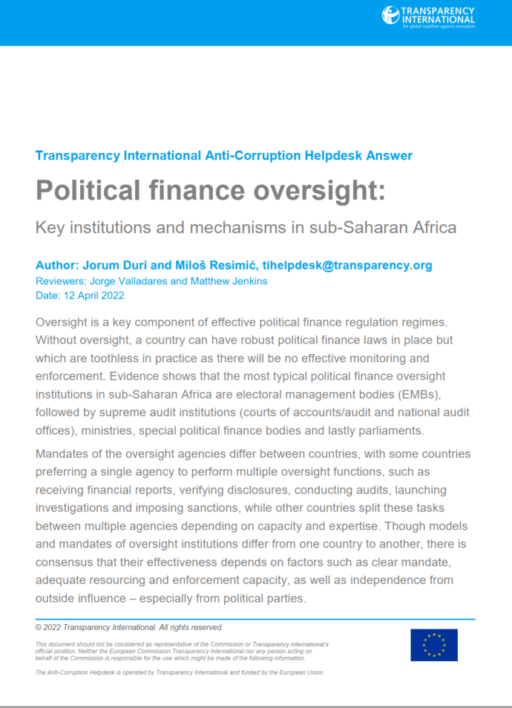- Home
- Anti-Corruption Helpdesk
- Political finance oversight: Key institutions and mechanisms in sub-Saharan Africa
Political finance oversight: Key institutions and mechanisms in sub-Saharan Africa

This Anti-Corruption Helpdesk brief was produced in response to a query from one of Transparency International’s national chapters. The Anti-Corruption Helpdesk is operated by Transparency International and funded by the European Union.
Query
Please provide an overview of political finance oversight, with examples from sub-Saharan Africa
Summary
Oversight is a key component of effective political finance regulation regimes. Without oversight, a country can have robust political finance laws in place but which are toothless in practice as there will be no effective monitoring and enforcement. Evidence shows that the most typical political finance oversight institutions in sub-Saharan Africa are electoral management bodies (EMBs), followed by supreme audit institutions (courts of accounts/audit and national audit offices), ministries, special political finance bodies and lastly parliaments.
Mandates of the oversight agencies differ between countries, with some countries preferring a single agency to perform multiple oversight functions, such as receiving financial reports, verifying disclosures, conducting audits, launching investigations and imposing sanctions, while other countries split these tasks between multiple agencies depending on capacity and expertise. Though models and mandates of oversight institutions differ from one country to another, there is consensus that their effectiveness depends on factors such as clear mandate, adequate resourcing and enforcement capacity, as well as independence from outside influence – especially from political parties.
Contents
- Introduction
- Institutional models of political finance oversight
- Key mechanisms of political finance oversight
- Conclusion
- References
Main points
- Electoral management bodies (EMBs) are the most common political finance oversight agency, followed by supreme audit institutions, ministries, special political finance bodies and lastly parliaments. However, each oversight agency has its own strengths and weaknesses, which should be taken into account.
- Some countries have chosen a hybrid model, mandating more than one agency to oversee different aspects of political finance. This appears beneficial as it ensures that agencies carry out specific oversight tasks in areas where they possess the requisite capacity and expertise.
- Whereas most EMBs in Africa are responsible for collecting financial statements from political parties and candidates, they are not the preferred institution for scrutinising financial statements – with supreme audit institutions preferred instead due to their rich expertise on auditing financial reports.
Authors
Jorum Duri and Miloš Resimić, [email protected]
Reviewers
Jorge Valladares and Matthew Jenkins, [email protected]
Date
22/06/2022

